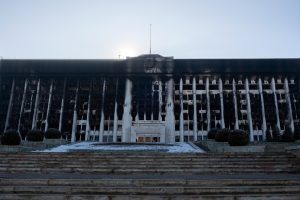Three years have passed since the harrowing events of January 2022 in Kazakhstan, known locally as Qandy Qantar, or Bloody January. What began as a regional protest against the removal of price caps on liquefied gas escalated into nationwide demonstrations demanding social and political change. The events culminated in a violent crackdown, marking a tragic chapter in Kazakhstan’s history. More than 200 people were killed, including two children, and many more were wounded. Nearly 10,000 people were detained, and countless individuals endured torture in detention, although the full extent remains unknown.
International Partnership for Human Rights (IPHR) and its partners have interviewed victims of torture during Bloody January to identify patterns of abuse, assess the victims’ circumstances, and advocate for justice. Recently, we published a report based on new interviews conducted in 2024. The testimonies paint a bleak picture of the “New Kazakhstan” promised by President Kassym-Jomart Tokayev after Bloody January. Most of the victims we interviewed reported that the investigations into their complaints about torture were closed due to an alleged lack of evidence. While hundreds of complaints about torture were filed after Bloody January, most of them have not made it to court for the same reason, resulting in widespread impunity for perpetrators and the lack of adequate compensation for victims.
Severe violations of detainees’ rights contributed to the widespread use of torture during Bloody January. Many detainees were denied prompt access to lawyers and were not given any opportunity to contact their relatives during the initial days of detention. Additionally, detainees were often held in irregular detention facilities, such as sports halls or military units. Law enforcement also targeted people believed to have been involved in the protests by searching hospitals for people with gunshot wounds and using phone registries to identify those who had been near the protest sites.
One such case is that of Marat, a bystander to the protests in Almaty on January 5, 2022. Marat was shot and taken to a hospital, where he underwent surgery to save his kidney. However, three days later, masked officers from the armed special police forcibly removed him from the hospital, despite his fragile condition and the catheter he still had in place. Marat is not the only patient subjected to such treatment; similar incidents were reported across the city. At the police station where he was taken, Marat endured severe beatings along with many other detainees. He also witnessed officials in uniform dousing people with boiling water.
Three years later, little has changed for Marat. His case was one of those closed due to the ‘’lack of evidence.”
This is where the situation becomes almost Kafkaesque. Marat explained:
The General Prosecutor’s Office informed me that my complaint about the torture I endured was closed on the grounds of lack of evidence. They specifically noted that I had not provided any photos that would confirm the fact of the torture. My lawyer and I couldn’t understand this response because, when being placed in a detention center, there is a procedure where all one’s belongings… are confiscated. I explained this and asked how I could possibly have collected visual evidence under these circumstances. They replied that there are cameras and logs in correctional facilities and that I didn’t provide any of this evidence. How could I have done that when the authorities have all the power? Also, I clearly remember that in my complaint about torture, I stated that all video cameras were covered with wet cloths and taped over.
Marat’s lawyer requested video evidence from the detention facilities, but was told that repair work had been carried out from January 8 to 17, 2022, so the surveillance cameras were not working.
Marat’s case is just one of many where torture victims during Bloody January have been denied justice, with perpetrators going unpunished and the legal system again failing to protect its citizens. Marat plans to take his case to international human rights bodies, but not everyone has the strength or energy to continue fighting for justice.
While over 30 security and law enforcement officials have been convicted for abuse during Bloody January, the number remains low compared to the scale of violations. The sentences issued have also often been lenient.
Kazakhstan must stop shielding officials responsible for torturing detainees in January 2022, re-open prematurely closed investigations, ensure accountability for all serious human rights violations committed during these tragic events, and provide compensation to the victims.

































